Is Bhutan a good place for tourism? Absolutely! Bhutan, the Land of the Thunder Dragon, nestled high in the Himalayas, offers a unique travel experience, blending pristine landscapes with vibrant Buddhist culture. SIXT.VN is here to guide you through everything you need to know to plan your unforgettable Bhutan trip. This guide will provide valuable insights on Bhutan travel, Bhutan tourist spots, and cultural experiences in Bhutan.
1. Is Independent Travel to Bhutan Possible, and Should I Use a Tour Operator?
While independent travel to Bhutan is technically possible, using a tour operator is highly recommended for a richer and more seamless experience. Bhutan has reduced its Sustainable Development Fee (SDF) to $100 USD per night (valid until August 2027), and no longer requires all-inclusive tour packages. However, to truly immerse yourself in Bhutanese culture and navigate its unique regulations, a tour operator is invaluable.
- Independent Travel: You can now book accommodations and guides independently, and even drive your own car (for a fee).
- Tour Operators: Enhance experiences like trekking, festivals, birding, or cycling. They handle logistics and ensure cultural sensitivity.
According to the official Bhutan Travel website, certified tour operators, guides, and accommodations can be found, ensuring a reliable and quality experience.
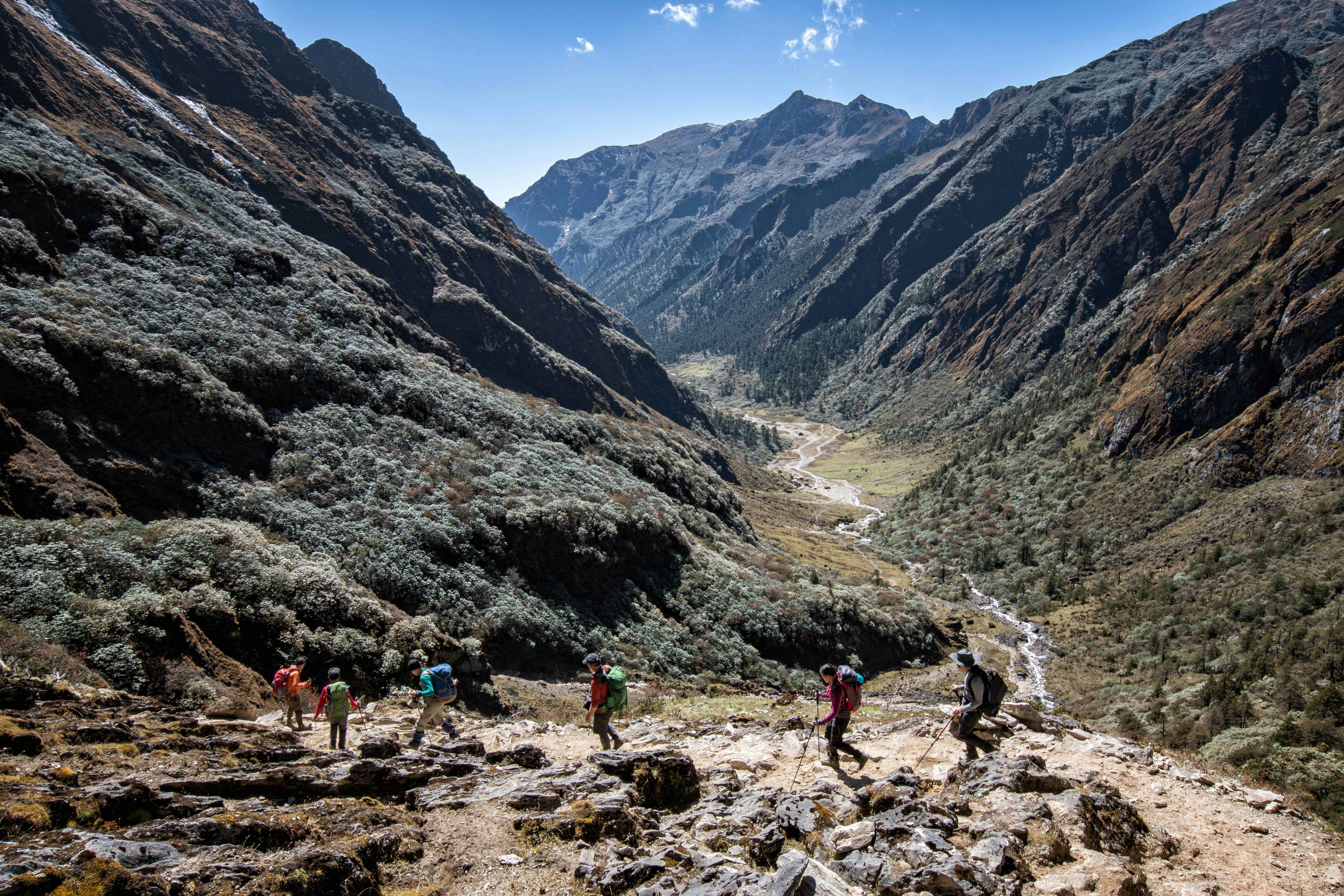 Trekers following a trail through a mountainous region
Trekers following a trail through a mountainous region
2. Do I Need Travel Insurance for Bhutan?
While proof of travel insurance is no longer required for a Bhutanese visa, it is highly recommended to ensure peace of mind during your trip. Adequate travel insurance should cover potential medical emergencies, trip cancellations, and unforeseen circumstances.
- Why it’s important: Travel insurance provides financial protection against unexpected events.
- Coverage: Ensure your policy covers medical expenses, emergency evacuation, and trip interruptions.
Having travel insurance allows you to explore Bhutan with confidence, knowing you’re protected from potential risks.
3. When Is the Best Time to Visit Bhutan for Festivals and Trekking?
The best time to visit Bhutan depends on your interests, with autumn and spring being popular for festivals and pleasant weather. However, each season offers unique experiences.
- Autumn (September-November): Ideal for tsechus (religious dance festivals) and colorful foliage.
- Spring (March-May): Rhododendrons bloom, enhancing the landscape.
- Summer (June-August): Lesser-known festivals, but not ideal for trekking due to muddy trails.
- Winter (December-February): Crowd-free visits with clear skies, perfect for photography. National Day celebrations on December 17 are a highlight.
Consider the December 17th National Day celebrations at Changlimithang Stadium in Thimphu for a chance to see the king!
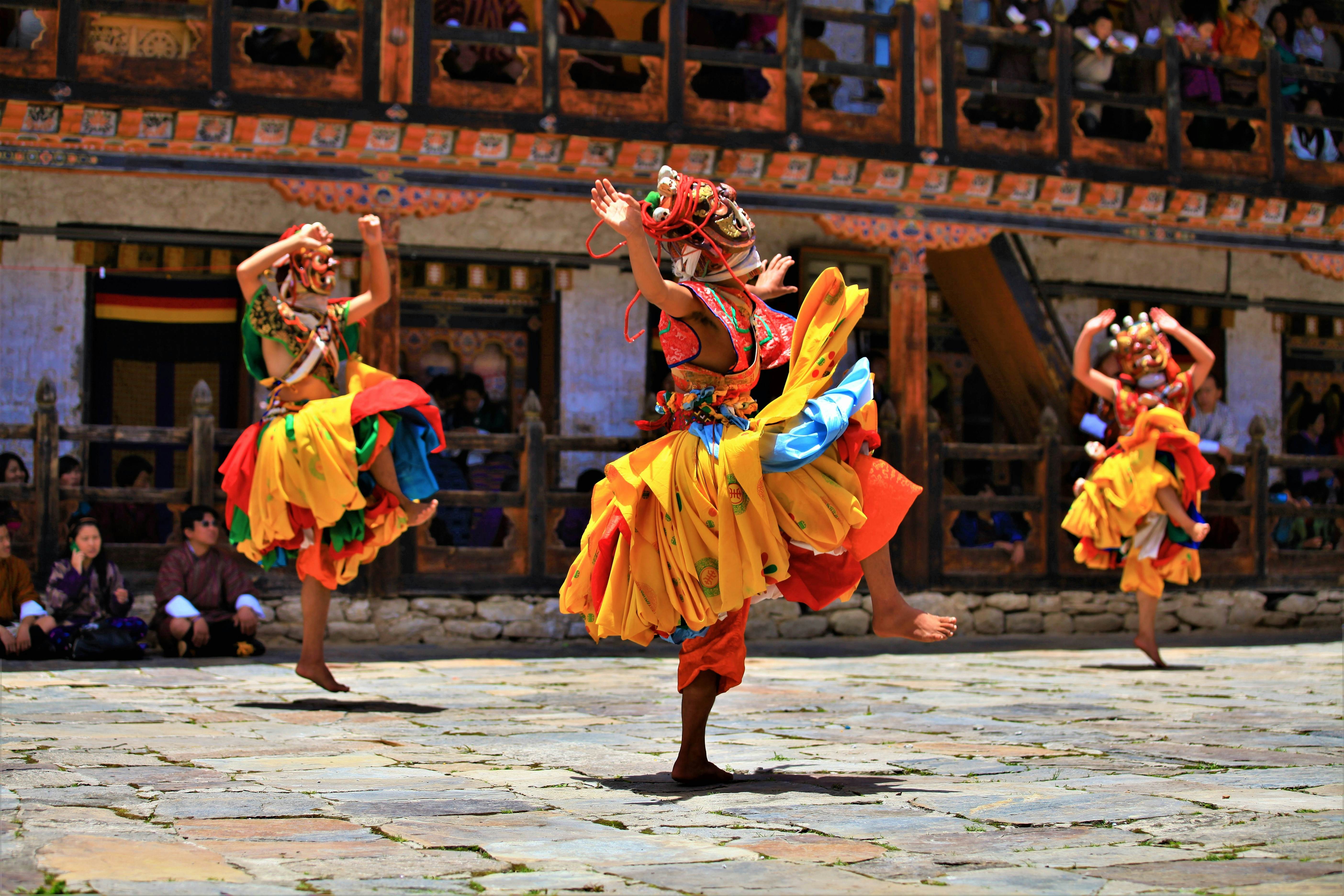 Monks wearing brightly colored costumes dance in a festival
Monks wearing brightly colored costumes dance in a festival
4. How Can I Fly to Bhutan, and Are There Overland Options?
Flying to Bhutan is a unique experience, and there are also options for overland travel via India.
- Airlines: Drukair and Bhutan Airlines are the only two airlines that fly to Paro International Airport, which is known for its challenging landing conditions.
- Direct Flights: Connect to destinations like Dhaka, Delhi, Kathmandu, Singapore, Bangkok, and Sharjah.
- Overland: You can reach Bhutan via India, but not China due to border disputes.
Flights to Paro are operated by select pilots authorized to navigate the mountainous terrain, adding to the adventure.
5. How Does Bhutan Maintain Its Status as a Carbon-Negative Country?
Bhutan stands out as the world’s first carbon-negative country through sustainable practices and constitutional mandates.
- Forest Coverage: A constitutional mandate requires maintaining a minimum of 60% forest coverage at all times.
- Environmental Conservation: Supported by the environmental conservation pillar of Gross National Happiness (GNH).
- Plastic Ban: Plastic has been banned since 1999, promoting a cleaner environment.
According to Bhutan’s constitution, preserving the environment is a national priority, contributing significantly to its carbon-negative status.
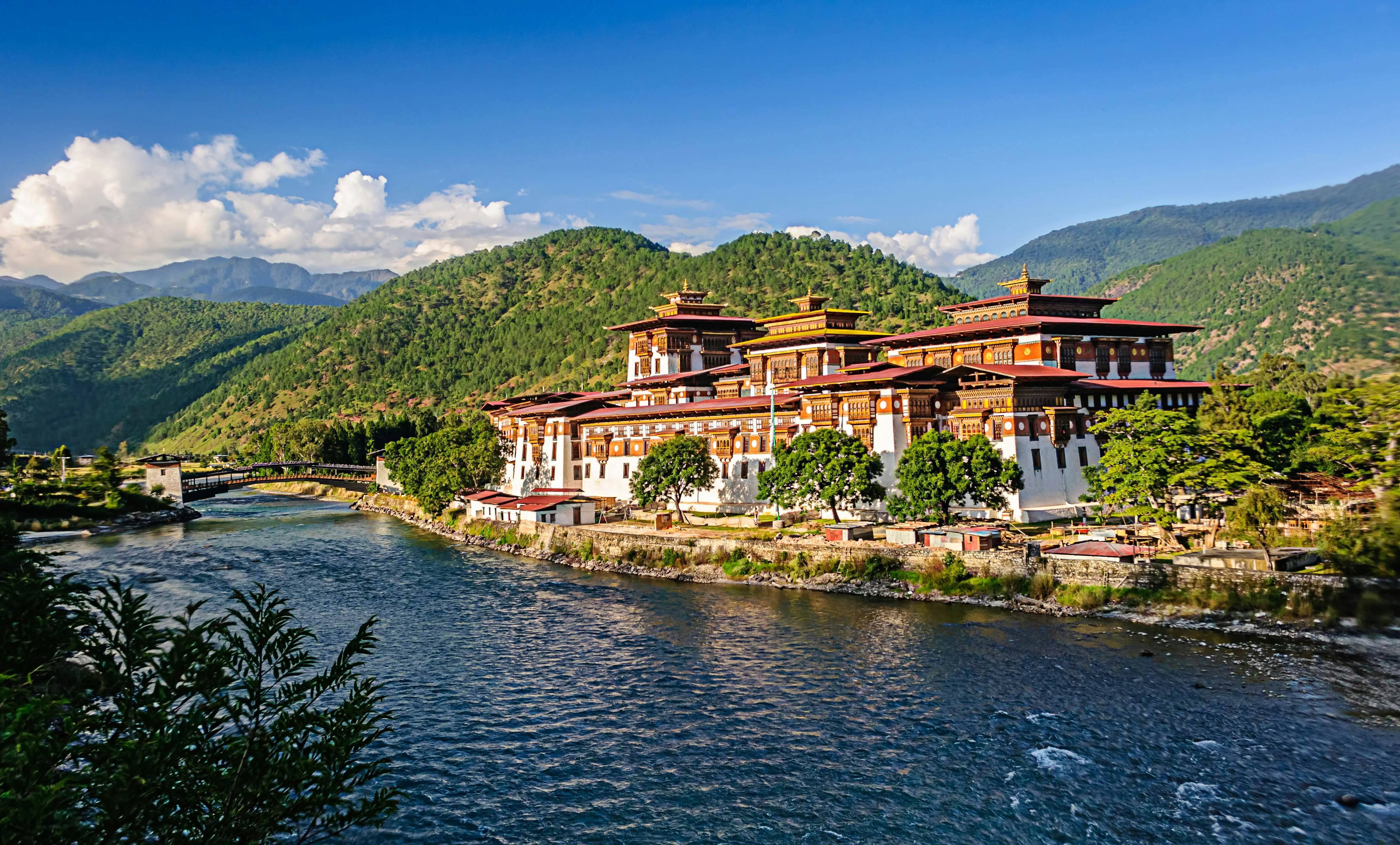 A riverside fortress surrounded by woodland
A riverside fortress surrounded by woodland
6. Is Bhutan a Safe Country for Tourists?
Bhutan is known for its exceptional safety, making it an ideal destination for solo travelers and families.
- Low Crime Rate: Violent crime is scarce, contributing to a peaceful environment.
- Safety for Solo Women: Bhutan is particularly safe for solo female travelers.
Bhutan’s emphasis on community and cultural values ensures a secure and welcoming environment for visitors.
7. What Vaccinations and Health Precautions Should I Take Before Visiting Bhutan?
While no vaccines are required for entry, it’s wise to consult your healthcare provider for recommended vaccinations and health precautions.
- Recommended Vaccinations: Hepatitis A and B, diphtheria, tetanus, typhoid, measles-mumps-rubella, and polio.
- Considerations for Longer Trips: Japanese encephalitis and rabies.
- Rabies Awareness: If bitten by an animal, seek immediate medical attention for post-exposure prophylaxis.
Staying up-to-date with vaccinations and health advice helps ensure a healthy and enjoyable trip.
8. How Can I Minimize Altitude Sickness in Bhutan?
Given Bhutan’s high altitude, minimizing altitude sickness is crucial for a comfortable trip.
- Gradual Ascent: Ascend slowly and take rest days when needed.
- Awareness: Pay close attention to symptoms like headaches, nausea, and shortness of breath.
- Descent: If symptoms don’t ease, descend immediately.
Consider acclimatizing before embarking on challenging treks like the Tiger’s Nest Monastery trek.
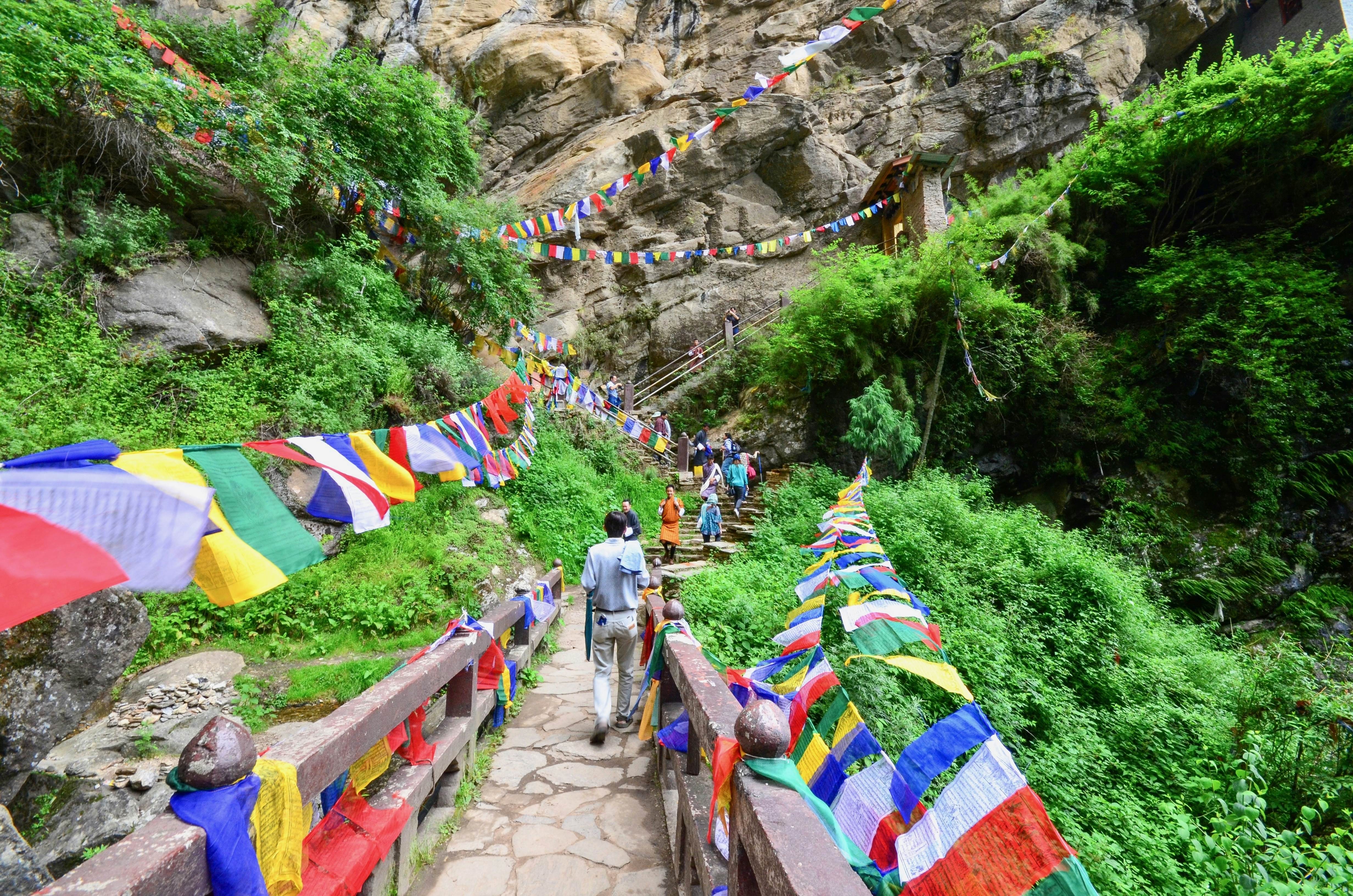 Pilgrims follow a path lined with prayer flags leading up to a series of stairs built into a rocky cliff face
Pilgrims follow a path lined with prayer flags leading up to a series of stairs built into a rocky cliff face
9. What Medical Essentials Should I Pack for a Trip to Bhutan?
Packing a few medical essentials can help you manage minor health issues and stay comfortable.
- Insect Repellent: Essential for protection against mosquito-borne illnesses.
- Sunscreen and Sunglasses: The sun is strong due to Bhutan’s high altitude.
- Motion Sickness Medication: Mountain roads are winding.
- Altitude Sickness Medication: Diamox can help prevent altitude sickness.
- Personal Items: Bring any specific toiletries or hygiene products you prefer.
Being prepared with these essentials ensures you can address minor health issues promptly.
10. What Healthcare Options Are Available in Bhutan, Including Traditional Remedies?
Bhutan offers a blend of traditional and Western medicine, providing diverse healthcare options for visitors.
- Traditional Medicine: Visit Thimphu’s National Institute of Traditional Medicine for ayurvedic treatments.
- Western Medicine: Hospitals and health clinics offer modern medical care.
- National Referral Hospital: The Jigme Dorji Wangchuck National Referral Hospital in Thimphu is the largest in Bhutan.
Explore traditional remedies and modern healthcare options to address any health concerns during your trip.
11. What Is Bhutanese Cuisine Like, and What Should I Expect?
Bhutanese cuisine is known for its spicy flavors and emphasis on fresh, seasonal ingredients.
- Key Ingredients: Hot chili peppers are a staple, as seen in dishes like ema datse (chilies with cheese) and kewa datse (potatoes, chilies, and cheese).
- Customization: Dishes can be modified to your spice preference if requested in advance.
- Restaurant Recommendations: Ask your tour operator or guide for recommendations to experience authentic Bhutanese cuisine.
Prepare your palate for bold flavors and enjoy the unique culinary experiences Bhutan offers.
 A top-down view of pan of chilies and cheese, or ema datse, the national dish of Bhutan
A top-down view of pan of chilies and cheese, or ema datse, the national dish of Bhutan
12. Is It Safe to Drink Tap Water in Bhutan?
Tap water in Bhutan isn’t safe to drink unless boiled or purified, so take necessary precautions to stay hydrated.
- Safe Options: Drink boiled water provided by your hotel or guesthouse, or purchase bottled water.
- Local Drinks: Enjoy local whiskey and lager, as Bhutan has a thriving craft-beer scene.
Staying hydrated with safe water options helps maintain your health and energy throughout your trip.
13. What Are Some Essential Etiquette Tips for Visiting Bhutan?
Understanding and respecting local etiquette enhances your interactions and experiences in Bhutan.
- Greetings: Say “Kuzu zangpo la” (hello) in Dzongkha while bowing slightly.
- Language: English is widely spoken, and adding “la” to the end of sentences shows respect.
- Hospitality: If invited to someone’s home, say “meshu meshu” while covering your mouth before accepting food.
Cultural sensitivity goes a long way in building positive relationships and gaining deeper insights into Bhutanese culture.
14. Is Tipping Customary in Bhutan?
Tipping is appreciated but not mandatory in Bhutan, particularly for guides and drivers.
- Guides and Drivers: Show appreciation by tipping at the end of your trip.
- Trekking Crew: Extend this gesture to the cook and helpers on a trek.
- Restaurants and Hotels: A 10% service charge is typically included, so additional tipping is not necessary.
Tipping acknowledges good service and contributes to the livelihoods of those who assist you during your travels.
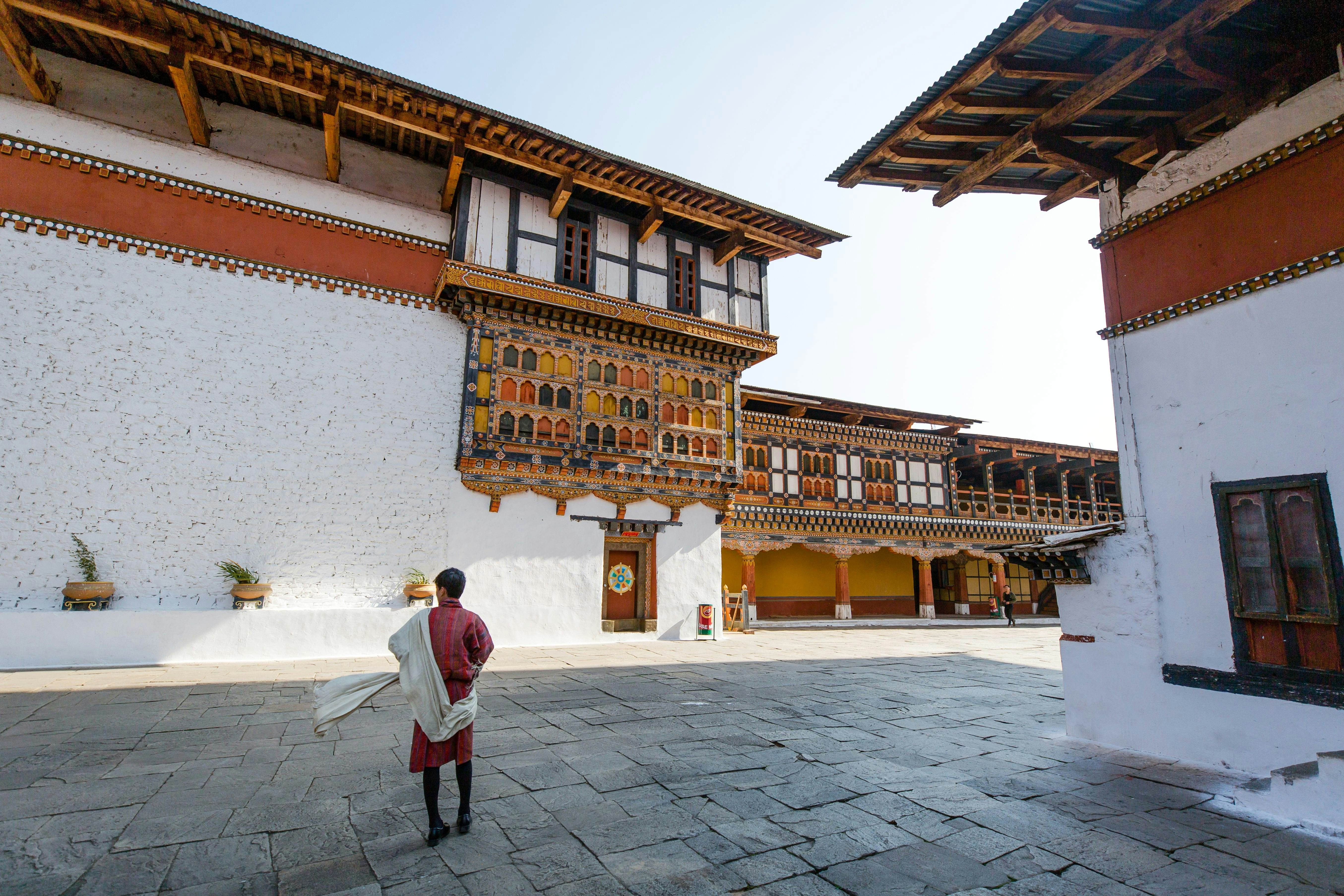 A guide in traditional Bhutanese dress walks through a monastery courtyard
A guide in traditional Bhutanese dress walks through a monastery courtyard
15. What Is the Nightlife Like in Bhutan, and Where Can I Experience It?
While Bhutan is known for its serene landscapes, it also offers a vibrant nightlife, particularly in Thimphu.
- Chang Lam Area: Centers around Chang Lam near the stadium, featuring bars and music venues.
- Popular Spots: Zone, Mojo Park, The Grey Area, Space 34, and Vivacity.
Explore Thimphu’s nightlife for a different perspective on Bhutanese culture and entertainment.
16. What Are the Smoking Regulations in Bhutan?
Smoking regulations in Bhutan are specific, and it’s important to be aware of them.
- Smoking Laws: While previously banned, smoking is now permitted but must be done “out of sight.”
- Vaping: Vaping products are available in limited locations in Thimphu.
- Cannabis: Remains illegal, with possession potentially leading to imprisonment.
Adhering to these regulations ensures you respect local laws and customs.
17. How Can I Appreciate Local Beliefs and Traditions in Bhutan?
Approaching Bhutan with an open mind enhances your appreciation of its rich cultural heritage.
- Folktales and Legends: Embrace stories of migoi (yeti) sightings, the significance of phalluses, and Guru Rinpoche’s legendary arrival on a flying tiger.
- Cultural Sensitivity: Be kind when questioning beliefs and consider setting aside preconceptions.
Immerse yourself in Bhutanese culture by engaging with its stories and traditions with respect.
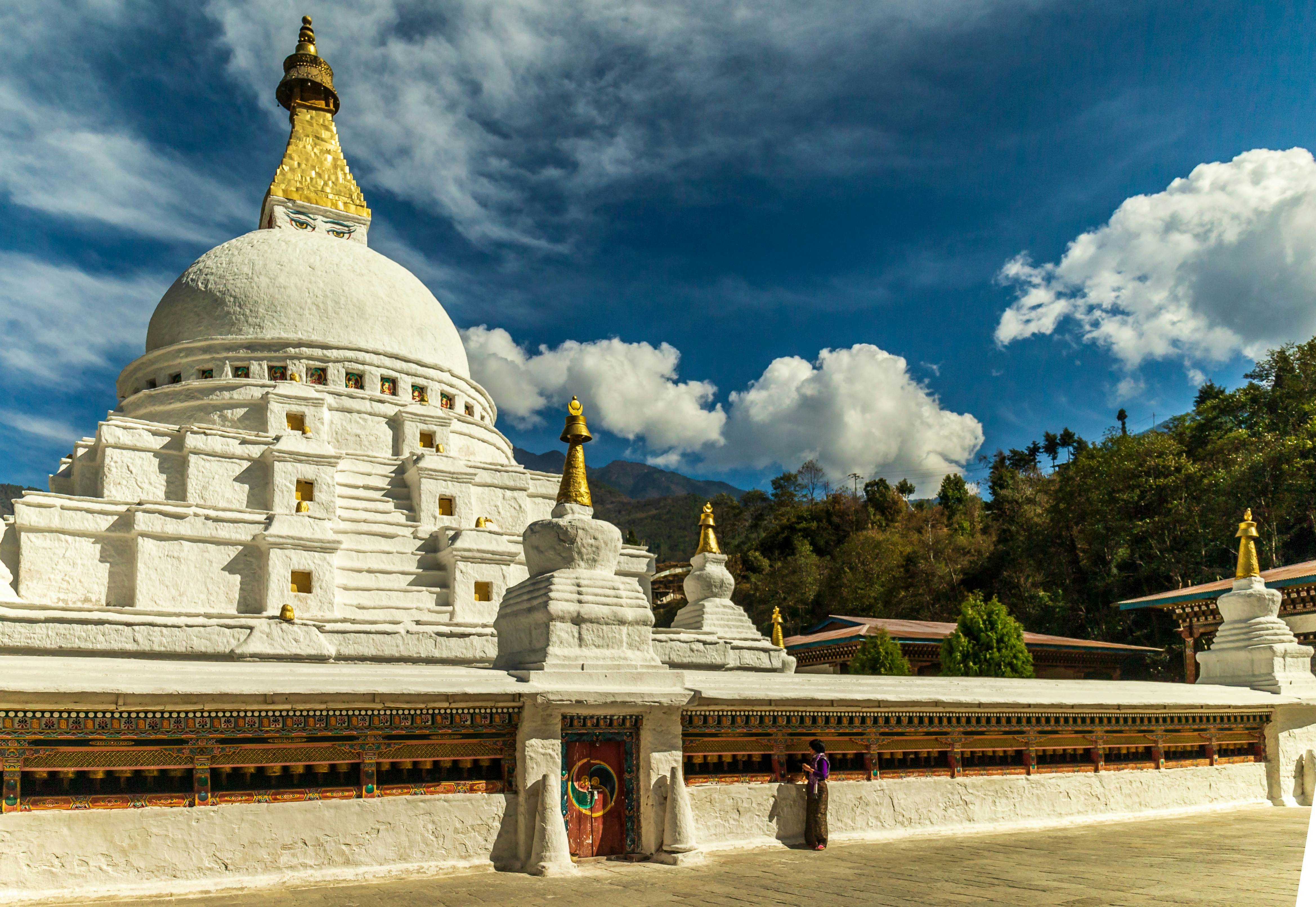 A large white chorten (stone Buddhist monument) with a gold pointed top
A large white chorten (stone Buddhist monument) with a gold pointed top
18. What Should I Pack in Terms of Clothing for a Trip to Bhutan?
Packing layers and modest clothing ensures you’re prepared for Bhutan’s varying temperatures and cultural norms.
- Layers: Essential for fluctuating temperatures and terrains.
- Modest Clothing: Required for entering temples and monasteries (cover shoulders and knees).
- Footwear: Hiking boots for treks and nicer shoes to wear with a gho or kira (Bhutanese national dress).
Pack thoughtfully to ensure comfort and respect for local customs.
19. How Can I Manage Money and Payments in Bhutan?
Managing money in Bhutan requires some preparation, particularly regarding cash and payment apps.
- Cash: Bring crisp bills, as ATMs can be unreliable.
- Currency: The official currency is the ngultrum, pegged 1:1 to the Indian rupee.
- Payment Apps: Most businesses accept cash or payments through goBoB or BNB MyPay apps.
Having small ngultrum notes is useful for offerings, donations, souvenirs, and tips.
20. Is It Easy to Get a SIM Card and Stay Connected in Bhutan?
Staying connected in Bhutan is now easier with readily available SIM cards.
- Availability: Obtain a SIM card upon arrival at Paro International Airport.
- Pocket Wi-Fi: Rent a pocket Wi-Fi device for reliable internet access in remote areas.
Having a local SIM card or pocket Wi-Fi helps you stay connected and navigate your travels.
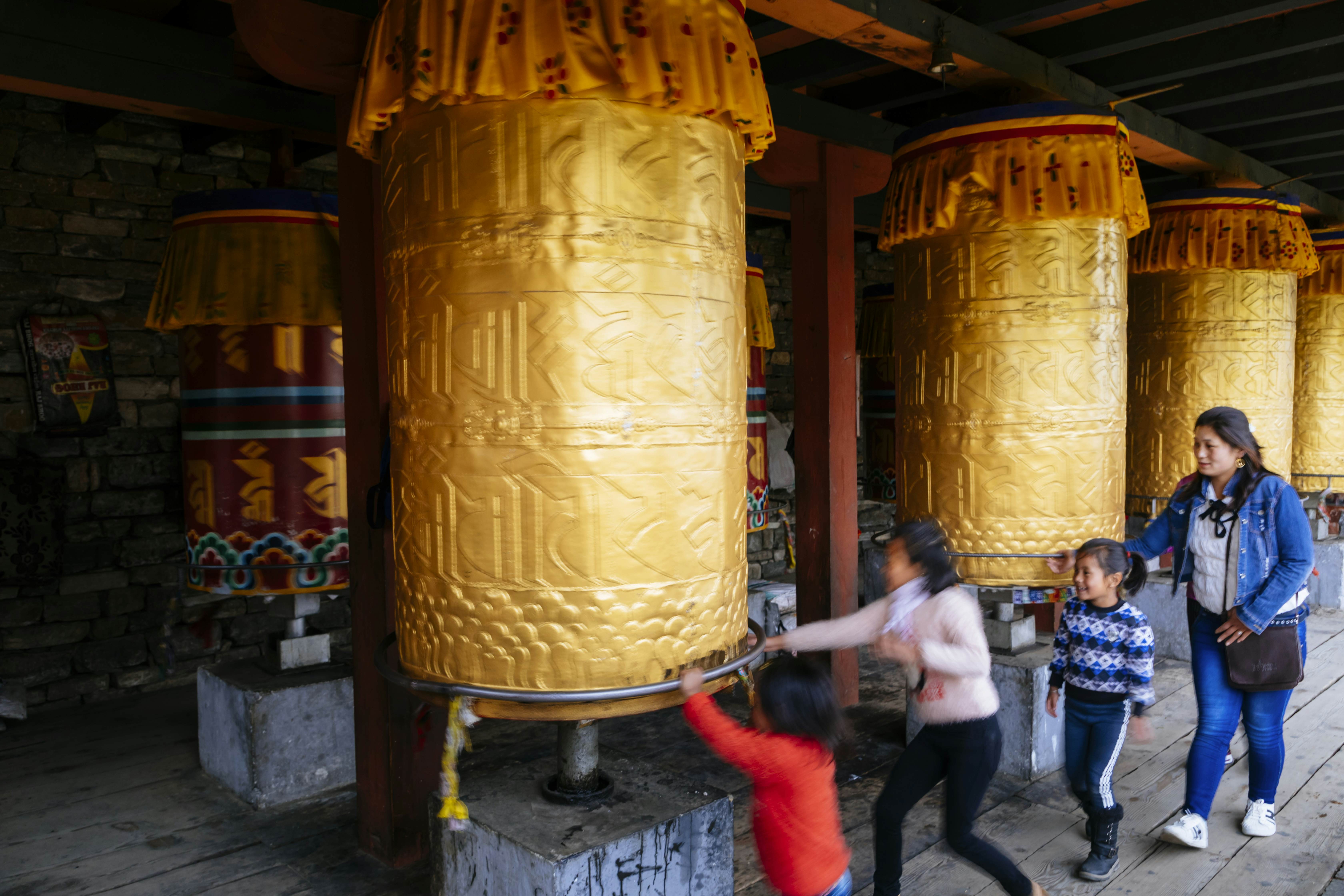 A woman and three young children spinning a prayer wheel in a monastery
A woman and three young children spinning a prayer wheel in a monastery
21. What Is the Proper Etiquette at Religious Sites in Bhutan?
Understanding and following proper etiquette at religious sites demonstrates respect for Bhutanese culture.
- General Rules: Remove shoes and hats, wear modest clothing, and refrain from photography in altar rooms.
- Circumambulation: Always circumambulate temples and shrines clockwise.
- Prayer Wheels: Spin prayer wheels clockwise.
Showing respect at religious sites enriches your experience and fosters positive interactions.
22. Is Bargaining Common in Bhutanese Markets?
Bargaining is not common in Bhutanese markets, and prices are typically straightforward.
- Fixed Prices: Pay the listed price without aggressive negotiation.
- Textiles: Be prepared to spend more on handcrafted textiles made from natural fibers.
Enjoy the shopping experience while respecting the local market customs.
23. How Can I Stay Updated on Festival Dates and Events in Bhutan?
Staying updated on festival dates ensures you can plan your trip around significant cultural events.
- Lunar Calendar: Bhutan follows the lunar calendar, so festival dates change annually.
- Gregorian Calendar: Some festivals, like Bhutan National Day, follow the Gregorian calendar and remain consistent.
Consult the lunar calendar to align your visit with specific festivals and events.
24. What Unique Experiences Does Bhutan Offer for Tourists?
Bhutan offers a plethora of unique experiences that sets it apart as a destination. From its commitment to Gross National Happiness to its stunning landscapes and rich cultural heritage, here’s a glimpse into what makes Bhutan special:
- Gross National Happiness (GNH): Explore Bhutan’s unique philosophy that prioritizes well-being and happiness over economic growth. Engage with locals to learn about the four pillars of GNH: sustainable development, preservation of cultural values, conservation of the natural environment, and good governance.
- Monasteries and Dzongs: Visit ancient monasteries perched on cliffsides, such as the iconic Tiger’s Nest Monastery (Taktsang), or explore imposing fortresses known as dzongs, which serve as religious and administrative centers. Each site offers insight into Bhutan’s Buddhist heritage and architectural grandeur.
- Festivals (Tsechus): Immerse yourself in colorful festivals filled with masked dances, religious rituals, and traditional music. These vibrant celebrations offer a window into Bhutanese culture and are held throughout the year in different regions.
- Trekking and Hiking: Discover Bhutan’s breathtaking landscapes through trekking and hiking opportunities. From short day hikes to multi-day treks through the Himalayas, experience pristine forests, alpine meadows, and panoramic mountain views.
- Cultural Immersion: Engage with local communities by visiting rural villages, participating in traditional activities like archery or weaving, or attending cultural workshops. Learn about Bhutanese customs, cuisine, and way of life firsthand.
- Wildlife Encounters: Explore Bhutan’s diverse ecosystems and encounter unique wildlife species, including the national animal, the takin, as well as snow leopards, red pandas, and black-necked cranes.
- Hot Springs and Spas: Relax and rejuvenate in natural hot springs or traditional spas, known for their therapeutic properties. Experience Bhutanese wellness practices rooted in ancient traditions.
- Archery: Try your hand at archery, Bhutan’s national sport, and witness the skill and precision of local archers during competitions and festivals.
- Preservation of Traditions: Witness Bhutan’s commitment to preserving its traditions, from its national dress to its architecture, language, and arts.
- Sustainable Tourism: Support Bhutan’s sustainable tourism initiatives, which aim to minimize environmental impact, preserve cultural heritage, and benefit local communities.
25. What Are the Best Places to Visit in Bhutan?
Bhutan is full of incredible destinations, each offering a unique glimpse into the country’s culture and natural beauty. Here are some of the best places to visit in Bhutan:
- Thimphu: As the capital city of Bhutan, Thimphu offers a blend of modern amenities and traditional charm. Visit the Tashichho Dzong, a fortress monastery that houses government offices and serves as the seat of the Je Khenpo, the spiritual leader of Bhutan. Explore the bustling weekend market, where locals gather to sell fresh produce, handicrafts, and textiles.
- Paro: Known for its stunning natural beauty and historical sites, Paro is home to the iconic Tiger’s Nest Monastery (Taktsang), one of Bhutan’s most revered pilgrimage sites. Hike to the monastery perched on a cliffside, offering breathtaking views of the surrounding valley.
- Punakha: Situated at the confluence of two rivers, Punakha is renowned for its majestic Punakha Dzong, considered one of the most beautiful dzongs in Bhutan. Explore the dzong’s intricate architecture, courtyards, and temples, and learn about its historical significance as the former capital of Bhutan.
- Bumthang: Known as the spiritual heartland of Bhutan, Bumthang is dotted with ancient temples, monasteries, and sacred sites. Visit the Jambay Lhakhang, one of the oldest temples in Bhutan, and explore the scenic valleys, apple orchards, and sheep farms that characterize the region.
- Gangtey (Phobjikha Valley): This glacial valley is renowned for its pristine natural beauty and is a haven for wildlife. Visit the Gangtey Monastery, perched on a hilltop overlooking the valley, and explore the Phobjikha Conservation Area, home to black-necked cranes that migrate here during the winter months.
- Haa Valley: This remote valley offers a glimpse into traditional Bhutanese rural life. Explore the scenic landscapes, visit local villages, and hike to remote monasteries and temples.
- Trongsa: Dominated by the imposing Trongsa Dzong, this town offers panoramic views of the surrounding valleys. Explore the dzong, which historically controlled trade routes between east and west Bhutan, and visit the Ta Dzong museum to learn about Bhutanese history and culture.
- Phuentsholing: This border town serves as the gateway to Bhutan from India. Explore the bustling market, visit the Zangto Pelri Lhakhang temple, and experience the vibrant atmosphere of this commercial hub.
26. How SIXT.VN Can Enhance Your Bhutan Travel Experience
SIXT.VN understands the challenges of planning a trip to Bhutan, and we’re here to provide comprehensive services to ensure a seamless and unforgettable experience. We offer:
- Customized Itineraries: Tailored to your preferences, time frame, and budget.
- Airport Transfers: Safe and convenient airport pickup and drop-off services. Address: 260 Cau Giay, Hanoi, Vietnam. Hotline/Whatsapp: +84 986 244 358.
- Hotel Bookings: A wide range of accommodations to suit your needs and preferences.
- Tour and Activity Bookings: Expertly curated tours and activities to explore Bhutan’s highlights.
- Flight Assistance: Assistance with booking flights at competitive prices.
Let SIXT.VN handle the details so you can focus on enjoying the magic of Bhutan.
FAQ: Your Questions About Tourism in Bhutan Answered
- Is Bhutan expensive to visit?
Yes, Bhutan is generally considered an expensive destination due to the Sustainable Development Fee (SDF). However, this fee contributes to sustainable tourism and conservation efforts. - Do I need a visa to visit Bhutan?
Yes, most nationalities require a visa to visit Bhutan. SIXT.VN can assist with the visa application process. - What is the official language of Bhutan?
The official language is Dzongkha, but English is widely spoken in tourist areas. - What currency is used in Bhutan?
The currency is the ngultrum (BTN), which is pegged 1:1 to the Indian rupee (INR). - Is it safe to travel alone in Bhutan?
Yes, Bhutan is considered one of the safest countries in the world for solo travelers. - What is Gross National Happiness (GNH)?
GNH is a unique development philosophy that prioritizes well-being over economic growth. - What should I wear when visiting temples in Bhutan?
Dress modestly, covering shoulders and knees, as a sign of respect. - Can I use credit cards in Bhutan?
Credit cards are accepted in larger hotels and shops, but cash is recommended for smaller establishments and rural areas. - What is the best way to get around in Bhutan?
The best way to get around is with a private car and driver, arranged through SIXT.VN. - Are there any restrictions on photography in Bhutan?
Photography is generally allowed, but restrictions may apply in certain religious sites. Always ask for permission before taking photos of people.
Ready to embark on your adventure to the Land of the Thunder Dragon? Contact SIXT.VN today to start planning your unforgettable Bhutan tour. Visit our website SIXT.VN or call us at +84 986 244 358 for personalized assistance.



